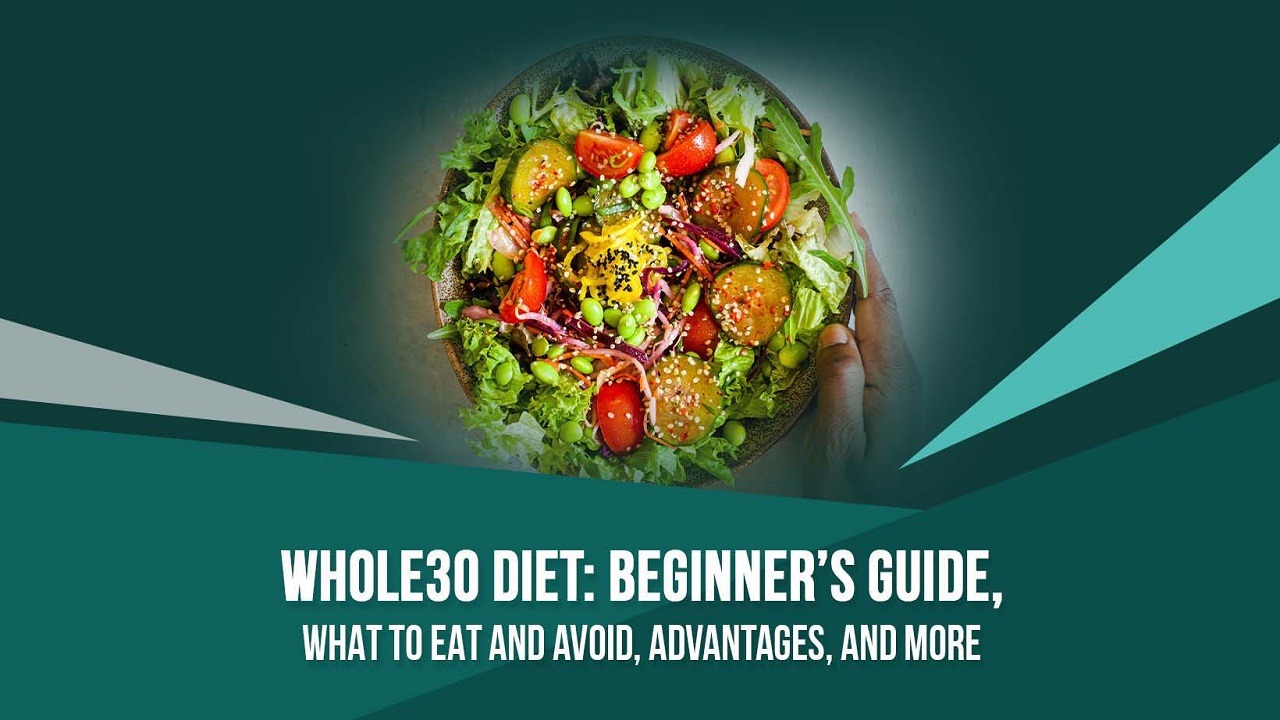Introduction to the Whole30 Diet
Contents
- 1 Introduction to the Whole30 Diet
- 2 Whole30 Diet Macros
- 3 Benefits of the Whole30 Diet
- 4 Improved Energy Levels:
- 5 Enhanced Mental Clarity:
- 6 Better Digestion:
- 7 Weight Loss:
- 8 Reduced Cravings:
- 9 Reinvigorated Sense of Well-Being:
- 10 Downsides of the Whole30 Diet
- 11 Elimination of Entire Food Groups:
- 12 Potential for Nutrient Deficiencies:
- 13 Challenge of Long-Term Sustainability:
- 14 Impact on Social Dynamics:
- 15 Lack of Individualization:
- 16 Potential for an Unhealthy Focus on Food:
- 17 Lack of Scientific Validation:
- 18 Whole30 Diet Details
- 19 Best Foods to Eat on the Whole30 Diet
- 20 Lean Proteins:
- 21 Colorful Vegetables:
- 22 Fruits:
- 23 Healthy Fats:
- 24 Eggs:
- 25 Nuts and Seeds:
- 26 Foods to Avoid on the Whole30 Diet
- 27 Processed Foods:
- 28 Grains:
- 29 Dairy:
- 30 Legumes:
- 31 Added Sugars:
- 32 Specific Food Additives:
- 33 Keys to Success on the Whole30 Diet
- 34 Common Myths About the Whole30 Diet
- 35 Common Mistakes on the Whole30 Diet
- 36 Whole30 vs Weight Watchers, Slow Carb, Mediterranean, and Paleo
- 37 Best Whole30 Diet Supplements
- 38 Omega-3 Fatty Acids:
- 39 Vitamin D:
- 40 Probiotics:
- 41 Magnesium:
- 42 Iron:
- 43 Collagen Peptides:
- 44 Electrolytes:
- 45 Whole30 Diet Recipes & Resources
- 46 Whole30 Recipe
- 47 Whole30 Diet Studies
- 48 Proponents of the Whole30 Diet
- 49 Conclusion
- 50 Frequently Asked Questions (FAQs) About the Whole30 Diet
In the ever-expanding world of diets and nutritional methodologies, the Whole30 Diet has risen to prominence as a unique and transformative approach to health and well-being. Originating from the minds of Melissa Hartwig Urban and Dallas Hartwig, this 30-day dietary reset has captivated the attention of many individuals seeking a holistic method to understand their relationship with food. In this extensive guide, we will delve deeply into the intricacies of the Whole30 Diet, examining its principles, methodologies, benefits, drawbacks, and how it compares to other popular diets.
Also Check: Slow Carb Diet | Potential Benefits for Ultimate Weight Loss & More
Whole30 Diet Macros
Unlike conventional diets that often revolve around the meticulous counting of calories or tracking macronutrients, the Whole30 Diet places a primary emphasis on the consumption of whole, nutrient-dense foods. The central tenet is the elimination of specific food groups for 30 days, allowing participants to identify potential sensitivities or allergies. The macro perspective of this diet is rooted in the philosophy of nourishing the body with real, unprocessed foods rather than adhering strictly to predefined macronutrient ratios.
Benefits of the Whole30 Diet

Proponents of the Whole30 Diet attribute a myriad of benefits to its implementation.
Improved Energy Levels:
One of the standout advantages cited by followers of the Whole30 Diet is a significant boost in energy levels. By focusing on whole, nutrient-dense foods and eliminating potentially draining elements such as added sugars and processed foods, participants often report sustained energy throughout the day. This enhanced vitality contributes to increased productivity, a more active lifestyle, and an overall sense of well-being.
Enhanced Mental Clarity:
The relationship between nutrition and cognitive function is a pivotal aspect of the Whole30 Diet’s impact. Eliminating foods that may contribute to inflammation allows for improved brain function and mental clarity. Many individuals undergoing the Whole30 experience heightened focus, better concentration, and an enhanced ability to tackle cognitive tasks. The removal of brain fog, often associated with certain dietary components, is a notable cognitive benefit.
Better Digestion:
Digestive health is a cornerstone of overall well-being, and the Whole30 Diet places a strong emphasis on supporting optimal digestion. By excluding potential irritants such as grains and legumes, individuals commonly report reduced bloating, gas, and digestive discomfort. The diet encourages the consumption of whole, easily digestible foods, fostering a gut environment conducive to nutrient absorption and a well-functioning digestive system.
Weight Loss:
While weight loss is not the sole focus of the Whole30 Diet, it often emerges as a positive byproduct for many participants. By eliminating processed foods, sugars, and potential inflammatory triggers, individuals may experience a natural recalibration of their body composition. This weight loss is generally accompanied by an improvement in body composition, with a reduction in body fat and an increase in lean muscle mass.
Reduced Cravings:
The elimination of foods that commonly contribute to cravings is a key aspect of the Whole30 Diet. By removing sugars, processed carbohydrates, and other potential triggers, participants often find that their cravings diminish significantly. This reduction in cravings is not only beneficial for weight management but also contributes to a healthier relationship with food, allowing individuals to make more mindful and nourishing choices.
Reinvigorated Sense of Well-Being:
Perhaps one of the most profound outcomes of the Whole30 Diet is the reported reinvigoration of overall well-being. Participants often describe a sense of vibrancy, improved mood, and a positive outlook on life. This holistic improvement in well-being extends beyond physical health, encompassing mental and emotional aspects. The removal of potentially inflammatory foods is believed to contribute to a balanced and harmonious state of being.
In essence, the benefits of the Whole30 Diet extend far beyond the superficial realm of weight loss. By fostering improvements in energy levels, mental clarity, digestion, and overall well-being, this dietary approach resonates with individuals seeking a transformative and sustainable journey toward optimal health. It underscores the profound connection between the foods we consume and the intricate balance of our body and mind, making the Whole30 Diet a compelling option for those on a quest for comprehensive well-being.
Downsides of the Whole30 Diet

While the Whole30 Diet has garnered acclaim for its transformative potential, it is not immune to scrutiny. Detractors and skeptics have voiced concerns regarding the diet’s restrictions, highlighting potential downsides that merit careful consideration.
Elimination of Entire Food Groups:
One primary criticism leveled against the Whole30 Diet is its stringent elimination of entire food groups during the 30-day reset. This includes grains, legumes, and dairy, which are valuable sources of essential nutrients such as fiber, vitamins, and minerals. Detractors argue that the exclusion of these food groups may increase the risk of nutrient deficiencies, especially if not adequately substituted with alternative nutrient-rich foods.
Potential for Nutrient Deficiencies:
Detractors express concern that the restrictive nature of the Whole30 Diet may lead to nutrient imbalances over the long term. Essential nutrients found in excluded food groups, such as calcium in dairy or fiber in grains, play crucial roles in supporting overall health. Critics contend that a prolonged absence of these nutrients could contribute to deficiencies, potentially impacting bone health, digestive function, and other vital bodily processes.
Challenge of Long-Term Sustainability:
The Whole30 Diet’s detractors emphasize the challenge of maintaining its strict guidelines over an extended period. While proponents argue that the 30-day elimination phase serves as a short-term reset, critics question the feasibility of adhering to such restrictions indefinitely. The elimination of familiar and culturally significant foods may lead to feelings of deprivation, making long-term compliance challenging for many individuals.
Impact on Social Dynamics:
Another downside of the Whole30 Diet is its potential impact on social interactions and lifestyle. Participating in social events, dining out, or sharing meals with family and friends can become challenging due to the diet’s restrictions. Detractors argue that such limitations may create feelings of isolation or make it difficult to engage in communal eating experiences, potentially affecting an individual’s overall quality of life.
Lack of Individualization:
Critics also point to the lack of individualization in the Whole30 Diet’s approach. The one-size-fits-all nature of the program may not accommodate the diverse nutritional needs and tolerances of individuals. Detractors argue that a more personalized approach, tailored to specific health conditions, dietary preferences, or cultural considerations, might be more effective and sustainable in the long run.
Potential for an Unhealthy Focus on Food:
The intense focus on food restrictions during the Whole30 Diet may, for some individuals, lead to an unhealthy preoccupation with dietary choices. Critics express concern that the strict guidelines and emphasis on compliance could contribute to an unhealthy relationship with food, potentially fostering guilt or anxiety around eating.
Lack of Scientific Validation:
While there is anecdotal evidence supporting the positive outcomes of the Whole30 Diet, some critics emphasize the lack of extensive scientific validation. The limited number of studies evaluating the diet’s long-term effects raises questions about its broader applicability and effectiveness beyond short-term improvements.
The Whole30 Diet, like any dietary approach, is not without its criticisms. While proponents highlight its potential for transformative short-term benefits, critics underscore concerns related to nutrient deficiencies, long-term sustainability, and potential social and psychological impacts. It is essential for individuals considering the Whole30 Diet to weigh these downsides against their specific health goals, lifestyle, and preferences, and to consult with healthcare professionals to make informed decisions about its suitability for their unique needs.
Whole30 Diet Details
To comprehend the Whole30 Diet fully, one must delve into its structural details. The diet entails a stringent 30-day elimination phase during which participants abstain from grains, dairy, legumes, added sugars, and processed foods. The rationale behind this strict exclusion is to allow the body to reset and identify potential food sensitivities or allergies. Following this elimination phase, foods are gradually reintroduced to observe their effects on the body, making it a unique and systematic approach to dietary exploration.
Best Foods to Eat on the Whole30 Diet

At the heart of the Whole30 Diet lies a profound commitment to nourishing the body with whole and unprocessed foods. This dietary philosophy is centered around selecting foods that not only satisfy hunger but also provide a rich tapestry of essential nutrients. The curated list of recommended foods encompasses a diverse range of options, carefully chosen to support overall health and well-being during the transformative 30-day reset.
Lean Proteins:
Lean proteins take center stage in the Whole30 Diet, offering a vital source of amino acids essential for muscle function and overall body repair. Preferred choices include grass-fed meats, such as beef or lamb, and poultry like chicken or turkey. Fish, particularly those rich in omega-3 fatty acids, such as salmon and sardines, are also celebrated as exemplary protein sources.
Colorful Vegetables:
The spectrum of colorful vegetables forms a crucial component of the Whole30 Diet, providing an array of vitamins, minerals, and antioxidants. Leafy greens like kale and spinach, cruciferous vegetables such as broccoli and cauliflower, and vibrant options like bell peppers and carrots showcase the diversity encouraged for optimal nutrient intake.
Fruits:
Whole, unprocessed fruits, in moderation, contribute natural sweetness and a plethora of essential vitamins and fiber. Berries, apples, citrus fruits, and melons are embraced for their nutrient density and role in supporting overall health. The natural sugars in fruits are considered a wholesome alternative to added sugars, aligning with the diet’s principles.
Healthy Fats:
Healthy fats play a pivotal role in the Whole30 Diet, promoting satiety and supporting various bodily functions. Avocados, rich in monounsaturated fats, olive oil, coconut oil, and nuts like almonds and walnuts are championed as sources of these essential fats. These fats contribute not only to flavor but also to the overall balance of macronutrients in the diet.
Eggs:
Eggs are celebrated for their versatility and nutritional density in the Whole30 Diet. Packed with protein, vitamins, and minerals, eggs offer a wholesome option for meals and snacks. Pasture-raised or omega-3-enriched eggs are often recommended for an enhanced nutrient profile.
Nuts and Seeds:
Nuts and seeds make a noteworthy appearance in the Whole30 repertoire, providing a satisfying crunch and an abundance of essential nutrients. Almonds, cashews, chia seeds, and flaxseeds are examples of nutrient-dense options, contributing healthy fats, protein, and micronutrients.
The Whole30 Diet’s focus on high-quality, nutrient-dense foods ensures that each choice serves a purpose in supporting overall health. By incorporating this symphony of lean proteins, colorful vegetables, fruits, healthy fats, eggs, and nuts, participants embark on a 30-day journey fueled by the diverse and nourishing elements of nature.
Foods to Avoid on the Whole30 Diet
Integral to the success of the Whole30 Diet is a keen understanding of the foods to avoid, as this exclusionary approach forms the bedrock of the 30-day reset. By eliminating specific food groups known to potentially cause inflammation or disrupt metabolic harmony, the diet creates a clean slate for participants to assess their body’s unique responses to various nutrients.
Processed Foods:
Processed foods, laden with additives, preservatives, and artificial ingredients, are unequivocally off-limits during the Whole30 reset. This includes packaged snacks, ready-to-eat meals, and any food item that has undergone significant processing. The emphasis is on consuming foods in their most natural and unaltered state.
Grains:
Grains, whether refined or whole, are excluded from the Whole30 Diet. This includes staples like wheat, oats, rice, and quinoa. The elimination of grains aims to reduce potential irritants, such as gluten and encourages the consumption of alternative nutrient-dense sources.
Dairy:
Dairy products, including milk, cheese, and yogurt, are omitted from the Whole30 Diet. The rationale behind this exclusion is multifaceted, addressing concerns related to lactose, casein, and potential inflammatory responses. Participants are encouraged to explore dairy-free alternatives during the 30-day reset.
Legumes:
Legumes, encompassing beans, lentils, and peanuts, find themselves on the list of restricted foods. While legumes are generally considered nutritious, their exclusion during the elimination phase allows participants to observe potential reactions and sensitivities, aligning with the diet’s principle of self-discovery.
Added Sugars:
The pervasive influence of added sugars is unequivocally rejected in the Whole30 Diet. This includes refined sugars, high-fructose corn syrup, and artificial sweeteners. By eliminating added sugars, the diet aims to recalibrate taste buds, reduce cravings, and address potential metabolic imbalances associated with excessive sugar consumption.
Specific Food Additives:
Certain food additives, such as sulfites, carrageenan, and MSG, are strictly off-limits during the Whole30 reset. This exclusionary stance aims to create an environment that minimizes potential sources of inflammation and supports a holistic approach to well-being.
Navigating the path of exclusion outlined by the Whole30 Diet requires vigilance and a commitment to scrutinizing ingredient lists. By avoiding processed foods, grains, dairy, legumes, added sugars, and specific food additives, participants create an environment conducive to self-discovery, reduced inflammation, and overall health improvement.
Keys to Success on the Whole30 Diet
Embarking on a Whole30 journey necessitates meticulous planning, unwavering commitment, and a supportive environment. Key strategies for success include meal planning, thorough label reading, and the exploration of alternative recipes that align with the diet’s guidelines. Additionally, cultivating a mindset of curiosity and self-discovery during the reintroduction phase is crucial for understanding how specific foods impact individual well-being.

Common Myths About the Whole30 Diet
Dispelling myths surrounding the Whole30 Diet is essential for gaining a realistic perspective on its objectives and outcomes. One prevalent misconception is the belief that it is solely a weight-loss program, whereas, in reality, its primary goal is to address overall health and well-being. The diet’s founders emphasize that weight loss if it occurs, is a byproduct of improved health rather than the sole focus.
Common Mistakes on the Whole30 Diet
Success on the Whole30 Diet is often hindered by common mistakes made by participants. Inadequate preparation for the elimination phase, incomplete label scrutiny, and a lack of systematic reintroduction of eliminated foods are among the pitfalls that individuals may encounter. Understanding and addressing these common mistakes are vital for a successful and fulfilling Whole30 experience.
Whole30 vs Weight Watchers, Slow Carb, Mediterranean, and Paleo
Comparative analysis of popular diets such as Weight Watchers, Slow Carb, Mediterranean, and Paleo offers valuable insights into their respective approaches, philosophies, and suitability for different individuals. Understanding these distinctions can aid individuals in making informed choices based on their unique needs and preferences. While the Whole30 Diet shares some commonalities with certain aspects of these diets, its emphasis on a 30-day reset and systematic reintroduction sets it apart in terms of structure and goals.
Best Whole30 Diet Supplements
The Whole30 Diet, deeply rooted in the philosophy of consuming whole, unprocessed foods, provides a robust foundation for overall health. However, recognizing that individual nutritional needs may vary, some individuals may choose to complement their dietary intake with carefully selected supplements.
Here are the best Whole30-compatible supplements to enhance the diet’s effectiveness:
Omega-3 Fatty Acids:
Omega-3 fatty acids, crucial for heart health, cognitive function, and inflammation control, are found in fatty fish. Since the Whole30 Diet encourages the consumption of fish, supplementing with high-quality fish oil capsules can provide an additional source of omega-3s, ensuring an optimal balance of these essential fats.
Vitamin D:
Vitamin D, primarily obtained through exposure to sunlight and found in limited dietary sources, is vital for bone health, immune function, and overall well-being. Given potential variations in sunlight exposure and limited food sources on the Whole30 Diet, a vitamin D supplement, preferably in the form of vitamin D3, can help maintain adequate levels.
Probiotics:
While the Whole30 Diet emphasizes gut health through the consumption of fermented foods, some individuals may benefit from additional probiotic supplementation. Probiotics support a healthy gut microbiome, aiding digestion and bolstering the immune system. Selecting a high-quality, Whole30-compliant probiotic can contribute to digestive well-being during the elimination phase.
Magnesium:
Magnesium, essential for muscle function, energy production, and stress management, can be found in various whole foods. However, supplementing with magnesium may be beneficial for individuals with specific needs or those experiencing difficulty meeting their magnesium requirements through food alone.
Iron:
For individuals following a Whole30 Diet with limited red meat consumption, ensuring adequate iron intake is crucial. An iron supplement, under the guidance of a healthcare professional, may be considered for those at risk of deficiency, such as menstruating individuals or those with specific dietary restrictions.
Collagen Peptides:
Collagen, a structural protein crucial for skin, joint, and connective tissue health, is naturally found in animal products. Incorporating a Whole30-compliant collagen peptides supplement can support these vital structures, especially for individuals seeking additional support for joint health or skin elasticity.
Electrolytes:
The Whole30 Diet’s focus on whole foods includes a reduction in processed and pre-packaged items, which can impact sodium intake. Individuals experiencing symptoms like fatigue or muscle cramps may consider supplementing with electrolytes, ensuring a balanced intake during the elimination phase.
While the Whole30 Diet predominantly revolves around whole foods, strategic supplementation can play a complementary role in optimizing nutritional intake. The choice of supplements should be guided by individual health considerations, and consulting with healthcare professionals ensures a well-rounded and personalized approach.
Whole30 Diet Recipes & Resources
Ensuring a varied and satisfying menu is crucial for the sustained success of the Whole30 Diet. A plethora of resources, including cookbooks, online platforms, and community forums, provide an extensive collection of recipes and guidance to keep meals exciting and aligned with the diet’s principles. Offering practical tips on meal prep, kitchen staples, and flavor enhancers can empower individuals to create delicious and compliant meals throughout the 30-day journey.
Whole30 Recipe
Here’s a delicious and Whole30-compliant recipe for Grilled Salmon with Lemon and Dill:
Ingredients:
- 4 salmon fillets
- 2 tablespoons olive oil
- Juice of 1 lemon
- Zest of 1 lemon
- 2 tablespoons fresh dill, chopped
- 2 cloves garlic, minced
- Salt and black pepper to taste
- Lemon wedges for serving
Instructions:
- Preheat the Grill: Preheat your grill to medium-high heat.
- Prepare the Marinade: In a small bowl, whisk together olive oil, lemon juice, lemon zest, chopped dill, minced garlic, salt, and black pepper.
- Marinate the Salmon: Place the salmon fillets in a shallow dish or a zip-top bag. Pour the marinade over the salmon, ensuring each fillet is well-coated. Marinate for at least 30 minutes, allowing the flavors to infuse.
- Grill the Salmon: Remove the salmon from the marinade and place it on the preheated grill. Grill for about 4-5 minutes per side or until the salmon easily flakes with a fork. Cooking times may vary based on the thickness of your fillets.
- Baste with Marinade: While grilling, baste the salmon with the remaining marinade using a brush. This adds extra flavor and keeps the salmon moist.
- Serve: Once the salmon is cooked through and has a nice grill mark, remove it from the grill. Serve immediately with lemon wedges on the side.
This Grilled Salmon with Lemon and Dill is not only Whole30-compliant but also packed with healthy fats and fresh flavors. Pair it with your favorite Whole30-approved vegetables or a side salad for a complete and satisfying meal!
Whole30 Diet Studies
Although more research is needed to comprehensively understand the impact of the Whole30 Diet, existing studies suggest that the elimination of specific foods may positively affect inflammation, gut health, and overall well-being. An exploration of these studies sheds light on the scientific foundation of the diet’s principles. Moreover, discussing the limitations and gaps in current research encourages a balanced perspective on the diet’s potential benefits and areas that require further investigation.
Proponents of the Whole30 Diet
Examining the perspectives of prominent figures and success stories within the health and wellness community who endorse the Whole30 Diet offers valuable insights. Understanding their experiences and motivations can provide inspiration and motivation for individuals considering or already on their Whole30 journey. Real-life anecdotes and testimonials underscore the diverse range of individuals who have found success and improved well-being through adherence to the Whole30 principles.
Conclusion
In conclusion, the Whole30 Diet stands as a unique and structured approach to nutrition, garnering both praise and criticism. The decision to embark on this dietary journey should be well-informed and aligned with individual goals and health considerations. As with any significant dietary change, consulting with a healthcare professional is advisable to ensure that the Whole30 Diet is a suitable and safe choice for the individual.
This nuanced exploration of its various facets in this comprehensive guide aims to equip readers with the knowledge needed to make informed decisions about their dietary journey. Whether you are a seasoned nutrition enthusiast or a newcomer to the world of dietary exploration, the Whole30 Diet offers a compelling and insightful pathway to understanding the profound connection between nutrition and well-being.
Frequently Asked Questions (FAQs) About the Whole30 Diet
These frequently asked questions offer insights into various aspects of the Whole30 Diet, addressing common concerns and providing guidance for individuals considering or currently undergoing this transformative nutritional journey.
- Is the Whole30 Diet primarily focused on weight loss?
The Whole30 Diet is designed to address overall health and well-being rather than being a weight-loss-specific program. While weight loss can occur as a byproduct of improved health, it is not the sole focus.
- Can I drink alcohol during the Whole30 Diet?
Alcohol, including wine and spirits, is not permitted during the 30-day elimination phase. It is recommended to abstain from alcohol to fully experience the diet’s benefits.
- What are the potential side effects of the Whole30 Diet?
Some individuals may experience temporary side effects, commonly known as the “Whole30 timeline,” including fatigue, cravings, or mood changes. These usually subside as the body adjusts to the dietary changes.
- Can I follow the Whole30 Diet if I have dietary restrictions, such as being vegetarian or vegan?
The Whole30 Diet’s emphasis on animal proteins may pose challenges for strict vegetarians or vegans. However, individuals can adapt the principles by focusing on plant-based whole foods, though it may require careful planning.
- Is the Whole30 Diet suitable for athletes or individuals with high physical activity levels?
Athletes or those with high physical activity levels may need to adjust their nutrient intake to meet energy demands. Proper planning and incorporating compliant sources of carbohydrates and proteins are essential.
- Are there alternatives to coffee during the Whole30 Diet?
Coffee is allowed on the Whole30 Diet but without added dairy, sweeteners, or non-compliant additives. Herbal teas, black tea, or other caffeine-free options are also acceptable.
- Can I use artificial sweeteners or sugar substitutes on the Whole30 Diet?
Artificial sweeteners and sugar substitutes are not allowed during the 30-day reset. The aim is to break the habit of relying on sweet tastes and reevaluate the body’s response to naturally occurring sugars.
- Is the Whole30 Diet safe for pregnant or breastfeeding women?
Pregnant or breastfeeding women are advised to consult with healthcare professionals before starting the Whole30 Diet. Modifications may be necessary to ensure adequate nutrient intake for both the mother and the child.
- How can I handle social situations or dining out during the Whole30 Diet?
Planning and communication are key. Researching restaurant menus, communicating dietary restrictions, and bringing compliant dishes to social gatherings can help navigate these situations successfully.
- Can I exercise during the Whole30 Diet, and how might it impact my fitness routine?
Exercise is encouraged during the Whole30 Diet, but individuals may experience changes in energy levels initially. Adjustments to the intensity and type of exercise may be necessary during the 30-day reset.
- What should I do if I accidentally consume a non-compliant food during the Whole30 Diet?
Acknowledge the mistake and continue with the program. Accidental slip-ups happen, and the focus should be on learning from the experience rather than dwelling on perfection.
- How do I reintroduce eliminated foods after the 30-day reset?
Reintroduction is a gradual process, with one food group reintroduced at a time. This systematic approach helps identify any potential reactions or sensitivities.
- Can children follow the Whole30 Diet, and if so, are there modifications?
While the principles of whole, unprocessed foods are beneficial for children, strict adherence to the Whole30 Diet may require modifications to ensure adequate nutrient intake for growing bodies.
- What role do spices and seasonings play in the Whole30 Diet?
Most herbs and spices are allowed on the Whole30 Diet, but it’s crucial to check labels for additives or non-compliant ingredients. Using a variety of herbs and spices can enhance the flavor of compliant dishes.
- How can I manage cravings for sugar or processed foods during the Whole30 Diet?
Cravings are common initially. Combatting them involves staying hydrated, consuming satisfying meals, and incorporating naturally sweet foods like fruit to help curb the desire for sugary treats.
- Can I continue the Whole30 Diet beyond 30 days?
While the initial phase is designed as a 30-day reset, some individuals choose to extend the principles or adopt a modified version as a long-term lifestyle. Consultation with healthcare professionals is advisable for extended adherence.
- Is the Whole30 Diet suitable for individuals with specific medical conditions, such as diabetes or autoimmune disorders?
Individuals with pre-existing medical conditions should consult with healthcare professionals before starting the Whole30 Diet. Modifications may be necessary to align with specific health needs.
- How can I ensure I’m getting enough fiber on the Whole30 Diet without grains?
While grains are excluded, ample fiber can be obtained from vegetables, fruits, and nuts. Careful meal planning ensures a well-balanced intake of nutrients, including fiber.
- What resources are available for support and guidance during the Whole30 Diet?
The official Whole30 website, community forums, and social media groups provide a wealth of resources, including meal plans, recipes, and support from others undergoing the program.
- Can the Whole30 Diet help with specific health issues, such as digestive problems or skin conditions?
While individual responses vary, some participants report improvements in digestive health and skin conditions. However, the diet is not a one-size-fits-all solution, and outcomes may differ for each individual.


